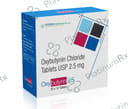Oxybutynin
Uses
Oxybutynin is used in the treatment of overactive bladder (OAB) symptoms. OAB is characterized by a range of urinary symptoms, including frequent urination, an urgent need to urinate, and an inability to control urination.
How it Works
How Oxybutynin Works Oxybutynin is an antimuscarinic medication. It functions by relaxing the muscles of the urinary bladder, thereby preventing frequent, urgent, or uncontrolled urination.
Expert Advice
- Oxybutynin treats symptoms of an overactive bladder by reducing the urge to urinate and controlling urination.
- Avoid caffeine, alcohol, and carbonated drinks, as they can exacerbate your symptoms.
- It may cause dizziness and blurred vision.
- Avoid driving or engaging in activities that require mental focus until you understand how it affects you.
- Side effects may include dry mouth, dry eyes, and constipation.
- Maintain good oral hygiene, drink water frequently, chew sugarless gum, and use contact lenses with caution.
- It may take up to 4 weeks to notice any improvement in your symptoms.
- Continue taking it as prescribed.
Related Medications
Oxybutynin 5mg

₹81.8

₹132.5
MRP ₹265
Oxybutynin 5mg

₹113

₹132.5
MRP ₹265
Oxybutynin 5mg

₹190.5

₹132.5
MRP ₹265
Oxybutynin 5mg

₹248.5

₹132.5
MRP ₹265
Oxybutynin 5mg

₹225

₹132.5
MRP ₹265
Oxybutynin 5mg

₹220.3

₹132.5
MRP ₹265
Oxybutynin 5mg

₹132.5
MRP ₹265
Oxybutynin 2.5mg

₹110.6

₹41.4
MRP ₹65.6
Oxybutynin 2.5mg

₹125.6

₹41.4
MRP ₹65.6
Oxybutynin 2.5mg

₹134.3

₹41.4
MRP ₹65.6
Oxybutynin 2.5mg

₹43.5

₹41.4
MRP ₹65.6
Oxybutynin 2.5mg

₹41.4
MRP ₹65.6
Oxybutynin 5mg

₹113.4

₹132.5
MRP ₹265
Oxybutynin 10mg

₹152.4
Flat ₹100 off on first app order | Use Code: APP100 |
Flat ₹100 off on first app order
USE CODE: APP100

Download Now